|
|
|
Sort Order |
|
|
|
Items / Page
|
|
|
|
|
|
|
| Srl | Item |
| 1 |
ID:
181895
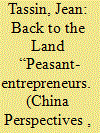

|
|
|
|
|
| Summary/Abstract |
This paper analyses the framing processes at play in the re-definition of “peasant agroecology” in contemporary China. Based on the study of “new-farmers” who have emerged in the networks of organic peasant agriculture, it interrogates the ambiguities of food ethics as the cornerstone of alternative food markets. The research explores the emergence of “peasant-entrepreneurs” (1) through the transmission of values and skills in processes of cultural heritage enhancement, (2) through the establishment of “trust” in the market relationship, and (3) through the negotiation between producers and retailers in a quality market for singular goods.
|
|
|
|
|
|
|
|
|
|
|
|
|
|
|
|
| 2 |
ID:
182477
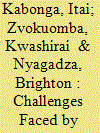

|
|
|
|
|
| Summary/Abstract |
The objective of the study was to capture the challenges that are faced by young informal traders in Bindura town, Zimbabwe. The study was motivated by the lack of attention to the challenges faced by young informal traders by the governing authorities at local and national level. We believe our study extends the understanding of the challenges faced by young informal traders, drawing on their everyday experiences and the navigation of the complex challenges they face. Deploying a qualitative research approach with in-depth interviews, focus group discussion and documentary analysis as data generation tools, the study found that young informal traders face several challenges that include lack of capital and harassment from municipal authorities as well as lack of mentoring and competition from established traders. Thus, the study established and concluded that within this difficult environment, young entrepreneurs employ different survival strategies such as raising capital from friends and relatives, relying on multifarious mentoring and coaching programmes from various sources. The paper recommends that government and private sector take up responsibility in nurturing these young entrepreneurs.
|
|
|
|
|
|
|
|
|
|
|
|
|
|
|
|
| 3 |
ID:
168878
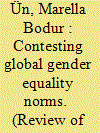

|
|
|
|
|
| Summary/Abstract |
Over the past two decades, constructivist International Relations (IR) scholars have produced substantial knowledge on the diffusion and adoption of global norms, emphasising the role of Western norm entrepreneurs in constructing and promoting new norms to passive, generally non-Western, norm takers. An emergent literature on norm dynamics unsettles this narrative of linear progress, highlighting the agency of diverse actors, including the agency of non-Western norm entrepreneurs, in normative change. This article contributes to this recent norm research by exploring the normative agency of local actors in the Turkish context, who have actively engaged in normative contestation over the meaning of gender equality. More specifically, the article reveals the crucial role of a pro-government, conservative women's organisation in subverting global gender equality norms and in promoting a local norm of ‘gender justice’ as an alternative. The article furthers research on norm contestation by analysing the discursive strategies and justifications local norm makers have adopted in the Turkish context upon encountering norms that challenged their normative beliefs and practices. Finally, the article critically engages with postsecular feminism, highlighting the agency of a religiously informed, conservative women's organisation as a non-Western norm entrepreneur.
|
|
|
|
|
|
|
|
|
|
|
|
|
|
|
|
| 4 |
ID:
163704


|
|
|
|
|
| Summary/Abstract |
This article draws on ethnographic research in Tanzania to interrogate the discourse of ‘public’ and ‘private’ in sub-Saharan irrigation development. It contrasts the complexity of social and political relations with narratives suggesting that ‘private’ is necessarily opposed and superior to ‘public’. We argue that support for models of private-sector development obscures access to and control over resources and can result in the dispossession of those least able to resist this. Different interests of ‘entrepreneurial’ individuals and corporate investors and the ways in which these relate to the state are also glossed over. Conversely, the failure of the ‘public’ cannot simply be read from the chequered histories of irrigation schemes within which public and private interests intersect in complex ways.
|
|
|
|
|
|
|
|
|
|
|
|
|
|
|
|
| 5 |
ID:
184657
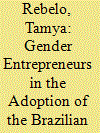

|
|
|
|
|
| Summary/Abstract |
On 8 March 2017, International Women’s Day, Brazil adopted a two-year National Action Plan (NAP) on Women, Peace and Security (WPS) with a clear commitment by the government for integrating gender perspectives in peace and security policies. With this decision, Brazil responded to the UN Security Council’s call for all Member States to develop national strategies to allow for successful implementation of Security Council Resolution 1325 (2000). Considering that it took almost two decades for Brazil to consider adopting its own plan, the driving forces behind this decision beg further exploration. This article draws on the concept of gender entrepreneurs to argue that the emergence of the Brazilian NAP was the result of an informal network of like-minded women, positioned inside and outside the government’s structures, who teamed up to harness political opportunities for change and push for the adoption of WPS global norms into a formal national commitment.
|
|
|
|
|
|
|
|
|
|
|
|
|
|
|
|
| 6 |
ID:
130550
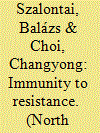

|
|
|
|
|
| Publication |
2014.
|
| Summary/Abstract |
Purpose-This article investigates whether certain social and subnational groups that have shown resistance against other one-party states might play a similar role in North Korea.
Design/methodology/approach-Comparing the DPRK with various Communist regimes and Baathist party-states in Syria and Iraq, this article examines the following social groups as potential factors of resistance: industrial workers, private entrepreneurs, and religious, ethnic and regional identities.
Findings-Resistance has not been wholly absent in North Korean, but the disaffected social groups have lacked sufficient bargaining power, while the state has occasionally refrained from steps that triggered protests in other countries.
Practical implications-By comparing the DPRK with various types of regimes (pre-reform Communist systems, partially market-oriented Communist systems, and Baathist party-states), the article also seeks to investigate whether the dynamics of North Korean society is largely unique, or if it can be at least partially explained by means of analogy.
|
|
|
|
|
|
|
|
|
|
|
|
|
|
|
|
| 7 |
ID:
148232


|
|
|
|
|
| Summary/Abstract |
This paper intends to describe new forms of national and transnational solidarity based on individual commitments to Islamic ethics and morality. This process is studied through the practices of young Muslim entrepreneurships that have emerged in the mid-2000s in Europe, promoting and distributing “islamized” conventional products in the fields of leisure, fashions, communication, in line with the cultural globalization as well as creating professional networks. This new market reflects on European Muslim’s desire for social mobility, using Islamized economic opportunities as a response to their marginalization, but also to create new forms of political pressure and religious codes through consumption that are adequate to their western environment.
|
|
|
|
|
|
|
|
|
|
|
|
|
|
|
|
| 8 |
ID:
122798


|
|
|
|
|
| Publication |
2013.
|
| Summary/Abstract |
The article discusses the role of norms in the foreign policy making of Central and East European states in the 2000s. It deconstructs the normative foundations of the so-called 'Atlanticist' orientation of Central and East European states, going beyond the standard 'neorealist' notion whereupon strategic and security concerns lead small states to align with superpowers. The case studies of the Czech and Slovak republics demonstrate that norms, such as human rights and democracy, have an autonomous and traceable effect on state behaviour. More specifically, we argue that norms have translated themselves into policy outcomes via the agency of influential 'norm entrepreneurs', such as ex-dissidents and their associates.
|
|
|
|
|
|
|
|
|
|
|
|
|
|
|
|
|
|
|
|
|